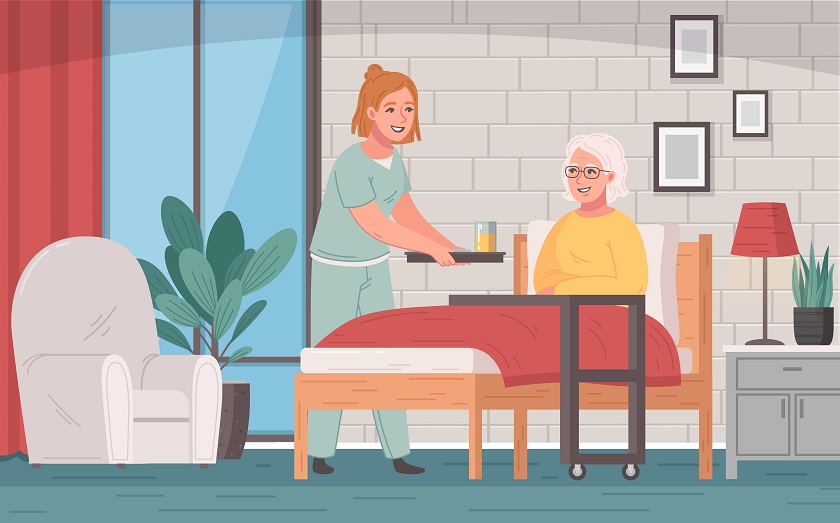As a caregiver, ensuring comfort for senior patients is a top priority. Here are some noteworthy tips. These simple steps can greatly enhance the quality of life for your senior patients.
Create a Comfortable Environment
Creating a comfortable environment for your senior patients is not just about physical comfort, it involves curating an atmosphere that caters to their emotional and psychological well-being as well. Here are some tips:
Empathy and Patience
Understanding and empathizing with the difficulties your senior patients may be experiencing is crucial. Patience is key when dealing with the elderly who may struggle with everyday tasks or require more time to process information. Remember, it can be tough for them to accept the need for help after a lifetime of independence.
Every interaction should be marked with kindness, patience, and respect. Be prepared to listen and show genuine interest in their stories, concerns, or fears. This will make them feel valued and understood and build a trustful and comforting relationship. This type of approach can significantly contribute to their emotional and psychological well-being.
Maintain a Regular Schedule
Maintaining a regular schedule is an effective way to provide stability and routine for your senior patients. The predictability of a structured day can be comforting and reduce anxiety, especially for seniors with cognitive impairments like dementia. Start by understanding their existing routines and build upon them.
This includes consistent meal times, medication, physical activities, and sleep. Remember, it’s not just about maintaining a strict schedule but incorporating activities they enjoy and look forward to. This could be a morning walk, an afternoon of gardening, or an evening of music.
Regular activities provide structure, stimulate their mind and body, and enhance their overall quality of life. Always communicate the day’s schedule and be flexible to accommodate changes based on their health condition or mood.
Prevent Isolation
Preventing isolation is critical in promoting emotional well-being for seniors. As a caregiver, you should encourage frequent interaction with loved ones, whether it’s through visits, phone calls, or digital platforms. Facilitate participation in social activities and community events that align with their interests, as these opportunities can stimulate their minds and combat feelings of loneliness.
If they’re comfortable with technology, introduce them to social media or virtual chat platforms for more consistent communication with distant family and friends. Alongside human interaction, consider pet therapy; animals can offer companionship, lessen stress, and inspire exercise. Always remember that helping the elderly feel connected and engaged will significantly improve their happiness and health.
Nutritional Needs
Meeting the nutritional needs of seniors is essential for their overall health and well-being. As metabolic rates decrease with age, it’s important to provide nutrient-dense meals that are low in sodium and sugar but high in fiber, protein, and healthy fats. Regular hydration is also crucial to prevent dehydration, which is common among seniors.
Introduce a variety of fruits and vegetables in their diet to ensure they receive a wide range of vitamins and minerals. If they have specific dietary needs or restrictions, consult a nutritionist or a doctor to create a balanced meal plan.
Lastly, make mealtimes enjoyable and social events. Eating in a pleasant, social environment can stimulate their appetite and improve their eating habits. Remember, proper nutrition is vital in maintaining their strength, supporting cognitive function, and boosting their immune system.
Pain Management
Managing pain in seniors can be a complex task due to the prevalence of chronic conditions, but it’s crucial to address it promptly and adequately. Effective pain management involves regular monitoring, appropriate medications, and sometimes, alternative therapies like massage or meditation.
As a caregiver, being observant of non-verbal cues such as grimacing, restlessness, or reduced mobility can help you detect pain early, especially in seniors who may struggle to communicate their discomfort. Speaking to a doctor about regular pain assessments is highly recommended. In severe cases, hiring a reputable hospice nurse can be invaluable.
They possess specialized training in palliative care, focusing on relieving the symptoms and stress of serious illnesses, ensuring your senior patients’ remaining days are spent with the highest possible quality of life. A hospice nurse can be a compassionate and understanding companion, aiding in pain management and providing emotional support, contributing significantly to the comfort and well-being of your elder loved ones.
Encourage Physical Activity
Encouraging physical activity among seniors is vital for maintaining physical strength, improving balance and coordination, and promoting overall well-being. Tailoring activities to their capabilities, preferences, and health conditions is essential.
Simple activities like walking, stretching, or chair yoga can be beneficial. If they’re more active, consider introducing light aerobics or resistance training. You should always consult a healthcare professional before starting any new fitness regimen.
Additionally, incorporate activities that stimulate mental health, like puzzles or games. Making the activities enjoyable and engaging will increase their willingness to participate. Remember, regular physical activity can help to reduce the risk of falls, improve sleep quality, boost mood, and slow cognitive decline. It’s not about rigorous workouts but about keeping them moving, engaged, and happy.
In conclusion, you must provide a comfortable, engaging, and nurturing environment for your senior loved ones as a caregiver. Remember, small steps can make a significant difference. So, implement these tips today to enhance their quality of life and ensure their golden years are truly golden.










